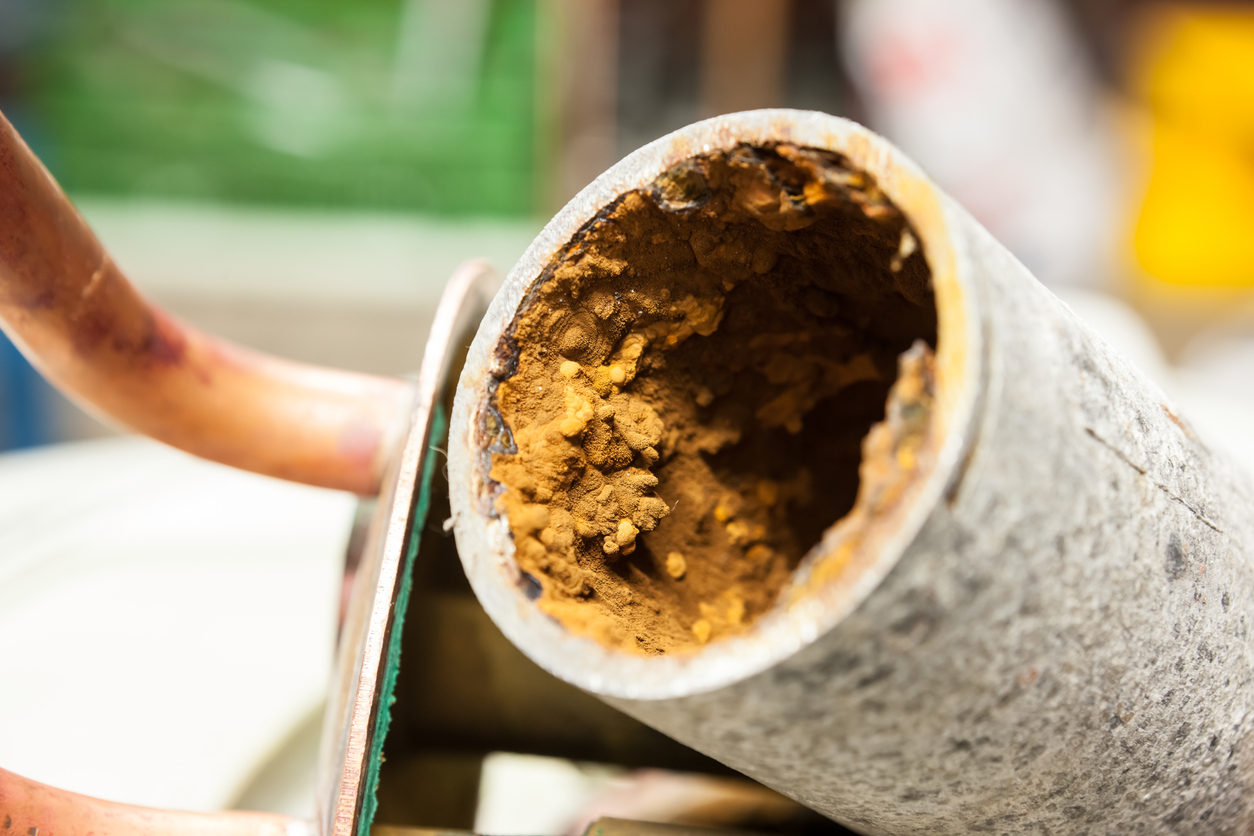
Dealing with Hard Water
Written by Diane M. Calabrese | Published May 2024

Inevitable. That’s the tidiest way to sum up the presence of minerals in water.
How could it be otherwise?
Water courses across the planet over substrates of rock and soil. Water earns the moniker “universal solvent,” and deservedly so because it takes more substances into solution than any other liquid compound.
Of course, what goes into a solution can also come out of that solution. And that’s where the problems with hard water begin.
Calcium, magnesium, and other metals may be present in water in amounts that are low and not so troublesome. Consider calcium, which may be present in water as calcium carbonate. At 60 milligrams per liter or less, calcium carbonate is not considered problematic, and the water is labeled as soft.
But beyond the first stop on the hardness scale (soft water), things get trickier. The hardness scale progresses, and water with more than 180 milligrams per liter of calcium carbonate is labeled “very hard” water.
Some geographical regions— because of the composition of the substrate—are known for water hardness. The U.S. Geological Survey ( USGS.gov ) provides maps of the general areas of hard water (both above ground and in aquifers).

Generally, however, residents of an area have a good idea whether their water is hard. The first clue is residue on clear glass. Then, there are the “tells” such as buildup in plumbing and sediment accumulating in hot water tanks. (Hot water hastens the sedimentation of salts.)
Almost never considered a health hazard, hard water does menace equipment. And that’s where we pick up the thread of dealing with it—all in the interest in realizing the greatest longevity of machines and components.
Hard water acts on a hot or cold pressure washer in a way analogous to the way cholesterol buildup occurs in the arteries says Augie Kooistra, owner of Augie’s Ag Sales in Ephrata, WA. (He adds that the arterial condition can necessitate open heart bypass surgery such as he experienced in September 2023.)
Prevention of clogging and/or scaling to the extent possible should be part of the plan. Could exclusive use of deionized water alleviate buildup of sediment?
“It can be helpful,” says Kooistra. “As a business in the ag industry, we have not done anything with deionized water.”
For now, the tactic of using deionized water is less than practical. “Cost, [meeting] machine requirements, and hassle” put it in the not-yet realm, explains Kooistra.
Kooistra provides other solutions for his customers. One, he offers an optional add-on water softener solution tank/plump on pressure washers.
“It doses out the softener liquid into the water box,” explains Kooistra. “It offers two benefits—it helps keep the pipes clean, and softer water cleans better.”
When Kooistra thinks about helping customers, he begins with acute attention to convenience. “For the user, convenience and performance, no maintenance, and simplicity are essential,” he explains. And for that reason, he has found one new product line a big attraction.
Kooistra put us in touch with two people so that we could (briefly) explore some of the possibilities. We report on their perspectives in turn in the next two sections.
“BIG ATTRACTION”
The product line Kooistra labels a “big attraction” comes from Magnation Water Technologies, which is headquartered in Oakland, CA. Mike Jenzeh is CEO and head of business development at the company.
What’s exciting and forward-looking about the approach of Jenzeh’s company is the focus on tapping physics instead of chemistry to condition water. The company serves the widest range of industries.
“Water quality affects all aspects of an operation, equipment longevity, maintenance, and energy saving,” explains Jenzeh. The techniques built into his company’s product offerings are state of the art.
State of the art in that the product line builds on solutions that shun chemicals, conserve energy, and slash maintenance. Among the laws of physics exploited is centrifugal effect. Working in concert with magnets used to instigate charging (Faraday effect), agitation and churning allow devices to gain control of elements like calcium. Separation of gases and particulates that can interfere with pumps and pipes results.
Yes, Jenzeh’s company works on large-scale projects. But the scalability of its approach holds out exciting possibilities to those who want to exploit some of the same design strategies to condition water for pressure washers.
Conditioning water is currently a very expensive endeavor for facilities—e.g., dialysis centers, which must have a verifiable and uninterrupted supply of deionized water. Processes like those Jenzeh’s company has incorporated in its products could bring down costs.
Jenzeh’s company already has a track record of reducing costs for companies. He points us to a case study at the company’s website that recounts the 42 percent savings in energy for HVAC at the Gap. (We often lose sight of how much energy is wasted when mechanical equipment must labor unnecessarily because water has gunk in it—even a little gunk—and worse, some of the gunk has settled on equipment components.)
“Mechanical wetting agents” is the name that Jenzeh’s company has adopted for its devices. “The devices are designed and patented for ease of installation after pumps and in valves,” he explains.
Flow rates, psi, size of pump, and amount of space for installation would all factor into the sort of customized recommendations Jenzeh’s company would provide to members of our industry. See more at the company’s website, Rainlikewater.com
MAGNETS?
Jerry Wurz with Anderson Pump House Ltd. in North Battleford, Saskatchewan, Canada, shares the enthusiasm of Kooistra for the possibilities that magnets and other processes straight from the world of physics are bringing to the world of conditioning water. He both shares some advice and reviews some parameters for those in our industry.
“My advice for a contractor or distributor is to try a Magnation water magnet,” says Wurz. “It will make your water softer since it breaks it up using magnet power. But not all water is the same.”
Wurz reminds us that the total dissolved solids (TDS) in water vary widely from place to place. But the results in any region can be noteworthy. “The device cleans lines and prevents scale buildup by 15 to 25 percent.”
And Wurz gives us one example: “We cleaned all our water lines in our hog barns three years back; we put a Magnation magnet on, and our lines are still as clean as the day we cleaned them.”
That good outcome in the example is compounded by the unimpeded performance of a pressure washer at the same hog barn. The gains result, explain Wurz, because the TDS do not cling on the water lines. “Water just flows unimpeded.”
With 30 years’ experience working with water, plumbing, etc., Wurz has some acute insights into dealing with hard water. Some of his reflections follow.
“Deionized and RO [reverse osmosis] water are basically the same machines taking all minerals, sodium, salt, iron, and metals out of the water using pumps to force the water through some very fine membranes, filtering water down to 0 microns,” says Wurz. “It’s considered dead water. Normal water has a pH of 7 to 8.
“All waters are different,” continues Wurz. “RO filtered water is acidic water, meaning the pH is below average in the 6-pH range. Normal pH is 7.4.”
Acidic water eventually becomes a destructive force. “It causes corrosion on brass faucets, copper lines, and metals,” says Wurz.
RO and deionized water machines get the job of making soft water done. But they require a lot of maintenance, explains Wurz. That is maintenance to clean membranes, restore pH to normal, and more. Moreover, an operator is needed to look after the unit.
Use of deionized water is one way to avoid issues related to hard water. But it is an expensive method, says Wurz.
Regardless, equipment users must deal with hard water. Not doing so leaves machines vulnerable to failure.
“When you heat hard water up—for example, in a domestic hot water tank or heat exchanger—the 180-degree Fahrenheit boiler water bakes the minerals, iron, magnesium, and all metals in hot water,” says Wurz. Scale buildup on heat coils occurs over time.
Scale on heat coils reduces machine performance. “After a few years, [you] won’t get enough heat transfer through the coils,” explains Wurz.
Cleaning coils requires taking the machine off-line to acid treat the water to eat away the scale. Thus, the better approach is to prevent scale buildup.
Wurz explains the cost effectiveness of alternative methods for dealing with hard water depends on the amount of water. For some it may be deionization or RO. For others it may be a device from Jenzeh’s company. It may be a combination of approaches.
In addition, when there is water in the very hard range, a catalyst may be required to augment the work of media filters. But because of the backwashing needed for filters, more water must be used in total.
Hard water is inevitable. Know the severity. Define the goal. Then, evaluate the possibilities for removing TDS in terms of speed, energy use, extra water use, and cost to find the best way to deal with it.





